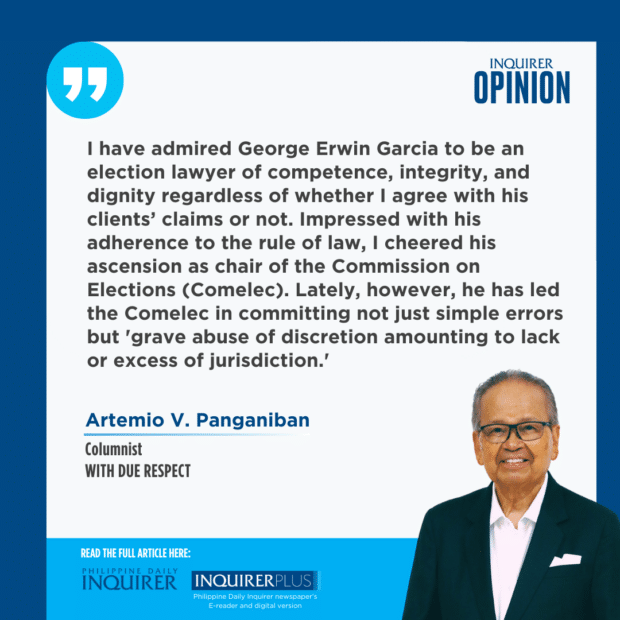
I have admired George Erwin Garcia to be an election lawyer of competence, integrity, and dignity regardless of whether I agree with his clients’ claims or not. Impressed with his adherence to the rule of law, I cheered his ascension as chair of the Commission on Elections (Comelec). Lately, however, he has led the Comelec in committing not just simple errors but “grave abuse of discretion amounting to lack or excess of jurisdiction (GAD).” Note that to be nullified, the discretion must not merely be abusive, but gravely abusive or whimsical and arbitrary. Let me give some samples.
IN SMARTMATIC VS COMELEC (April 16, 2024, per J Jose Midas P. Marquez, en banc, 15-0), the Supreme Court reversed the Commission for committing GAD in disqualifying Smartmatic “from participating in any public bidding for elections” due merely to the Comelec’s receipt of information from the “Department of Justice of the United States of America regarding an ongoing criminal investigation into former Comelec Chairperson Juan Andres D. Bautista in relation to procurement activities for the 2016” national elections. As a result, the Comelec awarded the automation of the 2025 elections to Miru Systems, the remaining bidder, in violation of its own rules and the due process rights of Smartmatic. I do not favor Smartmatic in any way, except that I believe that due process and the rule of law must always be observed in our democracy.
In general, a void act, like Comelec’s disqualification of Smartmatic, produces no legal effect from the very beginning. However, as an exception, under the doctrine of operative fact, acts done with GAD are not voided when their nullification will result in an injustice or inequity. It recognizes the reality that orders of constitutional, legislative, or regulatory bodies (like the Comelec) are presumed valid and acts done pursuant thereto are also deemed valid, unless and until reversed with finality.
Thus, in this example, the Court applied the doctrine because the nullification of Comelec’s award to Miru Systems, though legally void, will result in the inability of the Comelec to conduct the 2025 election under its strict timeline. Consequently, the Court made its decision prospective in its application and lectured Comelec on proper procedures in the future.
ANOTHER EXAMPLE: In De Guzman-Lara vs Comelec (Aug. 6, 2024, per J Jhosep Y. Lopez, en banc, 13-0-2), the Court again called out the poll body for committing GAD in failing to realize that a day is composed of 24 hours and that therefore, a petition for disqualification received by the Comelec beyond office hours via email but before midnight is deemed filed. The Court taught that “institutions with vast innovative resources such as the Comelec” should be able “to access a pleading filed beyond office hours … via email.”
A THIRD EXAMPLE: In Macalintal vs Comelec, the Court en banc—based solely on the petition filed by lawyer Romulo B. Macalintal—issued ex-parte a temporary restraining order “enjoining respondent Comelec from implementing its resolution providing, inter alia, that public appointive officials who accept their nomination as party-list representatives “may continue to hold office even after [the] acceptance of their nomination.”
The voided Comelec Act allowed party-list nominees—even after the filing of the certificates of candidacy of the party-list concerned within the period allowed by law (Oct. 1–8, 2024)—to remain in office for about two months more until the official campaign period begins, at which time they are deemed automatically resigned. Thus, these public officials are given the advantage of using the resources and perks of their offices to promote the candidacy of their party-list.
This abhorrent practice had already been thrashed by the Court in Quinto vs Comelec (Feb. 22, 2010, per CJ Reynato S. Puno, en banc) which held that all appointive officials are deemed resigned upon the filing of their certificates of candidacies. As a seasoned election lawyer, Garcia should have known the evil in allowing appointive officials like prosecutors, judges, military officials, police officers, etc. to use their offices to advance their already publicly known political aspirations.
A few days ago, Garcia told media (1) of the need to amend the party list law “to define (and) enumerate the different sectors that should be represented under the … System;” as it is, the Supreme Court has opened the flood gates to the dynasts, the powerful and the rich in what was originally conceived to be a means for legislative representation by the marginalized and the poor, and (2) the Comelec will publish on its website the certificates of candidacies of all aspirants to enable the public to scrutinize their qualifications.
While I agree with these two administrative leads, I still ask quo vadis, Chair Garcia? I hope, as I am confident, that he will redeem himself in quasi-judicial matters by sticking to his election law expertise. One chastisement for committing GAD may be acceptable, but multiple times? Quite painful for a lawyer of his caliber and stature. In the next case, I hope to cheer his rise.
—————-
Comments to chiefjusticepanganiban@hotmail.com

